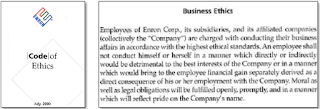Enron was an energy and service company created in Houston Texas
in 1985 that was once the seventh largest corporation in America. The company reached
an all-time high of market shares at $90 per share, and held the position as the
most innovative company for six consecutive years by Fortune magazine. That number quickly plummeted to below $1 when
Chairman, Kenneth Lay, and former CEO, Jeff Skilling were revealed to have
conducted what has now come to be known as the “Enron Scandal.” The
strategically planned unethical accounting fraud performed by CEOs Kenneth Lay
and Jeff Skilling resulted in the reporting of the largest bankruptcy in U.S.
history at the time in October 2001.
Through the use of accounting
loopholes and poor financial reporting Enron was able to hide billions of
dollars in debt in addition to manipulating the sale of energy at higher prices
in order to increase their revenue. Kenneth Lay and Jeff Skilling misrepresented
earnings and modified their balance sheets to indicate profits when in fact the
company was undergoing substantial losses. They pressured employees to find
ways of hiding the debt, and witnesses have testified that Enron has undergone
numerous schemes to manipulate energy prices by creating artificial capacity
shortages. During the June 2000 west coast power outage, injuries and accidents
were caused in California by Enron having allegedly directly caused a blackout
that they would later cash in on through manipulative energy trading. Over 100,000
residential and business consumers were left without power for roughly two days.
Markets are subject to the ongoing laws of supply and demand. The
impact of their success or failure in the face of competition and in the
business environment during the businesses cycles are a result of decisions
that are made by those businesses. Enron has effectively done what is best to
earn profits for its CEOs while destroying the lives of its employees.
Additionally, they ignored the rights of citizens by initiating a blackout,
cheated shareholders by denying them relevant and fair information, and completely
disregarded any concept of a responsibility to the livelihoods of its
stakeholders. Enron performed both illegal and unethical activities that
resulted in over 29,000 employees losing not only their jobs but also 1.2
billion dollars in retirement funds and pensions. Shareholders did not fare
better as they are actively suing the company for over 20 billion dollars.
Despite having received limited returns in lawsuits the end result remains
the same for the victims of Enron’s greed. When a company like Enron makes decisions that
go against the commonly used ethical norms of utility, rights, justice, and
caring they effectively earn a competitive advantage that violates even their
own code of ethics and falls contrary to their July, 2000 corporate mandate to ”..conduct their business affairs in
accordance with the highest of ethical standards.”
Most of the time healthy competition is fine but when a business
goes beyond creating a competitive advantage and threatens the lives of others,
it then abolishes its moral corporate social responsibility to the commitment
of its constituents while simultaneously defacing its long term perceptions in
their minds. Perhaps the greatest failing by Enron is in its managerial social
responsibility to weed out the moral precursors to its illegal activity that
has led to the name Enron being affiliated with perceptions of corporate
scandal. A perception that has been spread to known participants that were paid
out in bribes; for example The Law Firm of Vincent and Elkins, and the
accounting firm of Arthur Anderson who received $1 million a week to hide the
company’s affairs. Had Kennith Lay and Jeffrey Skilling conducted their affairs
in a manner that demonstrated moral decision making by releasing honest
financial reports of the firms performance to shareholders, and provided
credible movements towards sustainability they may not of had to resort to the
unethical business practices that they conducted.
In
the aftermath of the scandal, over 25 criminal counts of fraud charges were
brought before Enron. Jeffrey Skilling was sentenced to 24 years in jail while Kenneth
Lay had died before sentencing. The accounting firm of Arthur Anderson was also
convicted of obstructing justice when the company was found to have been
shredding an undetermined number of Enron accounting documents to cover up the
billions of dollars in losses by Enron during the investigation. A Vice
President at Enron by the name of John Clifford Baxton is said to have been
among the few at Enron to have learned from their distorted ethical judgements.
Baxton resigned in May 2001 and agreed to testify before Congress in the Enron
case. Baxtons despair on the adverse practices at Enron can be extrapolated
from his suicide note he left for his wife, Carol in the following year.
Citations:
Enron Scandal (Emmy Award)
Enron Scandal
Enron scandal
Enron: We ask
why.
http://abusinessday.blogspot.ca/2011/11/enron-we-ask-why.html
Enron
Enron scandal
https://en.wikipedia.org/wiki/Enron_scandal
Enron linked to California
blackouts
Forbes
http://www.forbes.com/sites/investopedia/2013/02/05/5-most-publicized-ethics-violations-by-ceos/


No comments:
Post a Comment